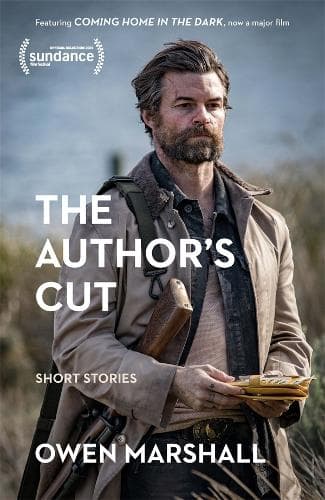Review: The Author’s Cut - short stories
Reviewed by David Hill
I'll start by embarrassing the author. Owen Marshall is such a rewarding guy to talk with. He's attentive, courteous, responsive. So are a lot of his protagonists. They're predominantly male, often rural or small-town based. They live apparently conventional lives, are reserved when it comes to voicing yearnings and regrets. Woke, they ain't. They really shouldn't hold and affect readers the ways they do.
The 20 chronologically-shuffled stories here, chosen by Marshall himself, cover multiple decades of publication, from “Supper Waltz Wilson” (remember the impact that collection made when it came out in – gulp – 1979?), to five pieces from Living As A Moon, in 2009. A couple edge towards novella size: you see in them the structural skills which help make the writer a significant novelist as well.
Note the cover – a stylishly sinister frame from the screen version of “Coming Home In The Dark.” Yes, it's been turned into a movie. Excellent. I've often thought that Marshall's dialogue-rich, scene-specific narratives should be. Actually, it's not a movie, sorry; it's “a major film.” I'll digress to mutter how refreshing it would be to read that something has been made into “a modest film.”
What a shocking tour-de-force “Coming Home” is. I exclaimed out loud the first time I read it; sentences in it still make me catch my breath. That's all I'll tell you about it; no spoilers for this relentless, battering narrative that stands like a gaunt black archway at the start of the book.
Short stories don't sell - so publishers and booksellers tell us. Unless they're by Owen Marshall, that is. He moves with dignified ease from “pale Assisi” to South Island shingle rivers, the University at Grenoble to suburban side streets. His renderings of male friendship are consummate; “Cabernet Sauvignon With My Brother” is rich, restrained, and given – if I'm right – an extra poignancy by the dedication of this selection.
He does male enmity well, too. Try Dr Luca Matteotti from “A Watch of Gryphons,” whose aquiline nose you'll want to tweak, or Crealy in “The Rule of Jenny Pen,” whose predations through Totara Eventide Home end in the most satisfyingly macabre manner. (Rest Home libraries will not be stocking copies of The Author's Cut.)
His males are potent creatures, even when broken and wheelchair-bound, or failing “after a lifetime in the indifferent, hostile or contemptuous regard of others.” Supper Waltz Wilson at 15 “seemed old in the ways of the world.” Randy Colum, of “Anacapri,” has his sphere of influence; the eponymous protagonist of “Hodge” creates gloriously comic carnage.
Pick up any anthology that has an Owen M story and you recognise it instantly. The settings, the protagonists, the meticulous, almost stately prose style blending mischief with philosophical pronouncement: “Self-consciousness is lost with the passing of years”; “There is in the psyche of every man an unconscious, archetypal image of how a woman should be.” He even gets away with authorial intrusions. How enviable.
Favourites from these 20? Close your eyes and stab your finger. I have to include “The Divided World”, that marvellous fusion of poetry and prose: “The world is divided between those who appreciate Jane Austen, and fools.... between those who wake in the darkness with tears, and those too drugged to dream.” I'll add the crawly savagery of “Mumsie and Zip”, plus “Finding Lear”, with its disintegrating yet majestic old man. The vulnerable, vital young animals of “The Master of Big Jingles.” And the 16 others.
You settle into Owen Marshall's stories with the trust and satisfaction with which you greet a valued friend, open a bottle of good red, sit down before a manuka fire. Mr Dependable coupled with Mr Unexpectedly Challenging. That's pretty enviable, too.
Reviewed by David Hill
David Hill’s two new YA books, Coast Watcher and Three Scoops, will be published in August.
